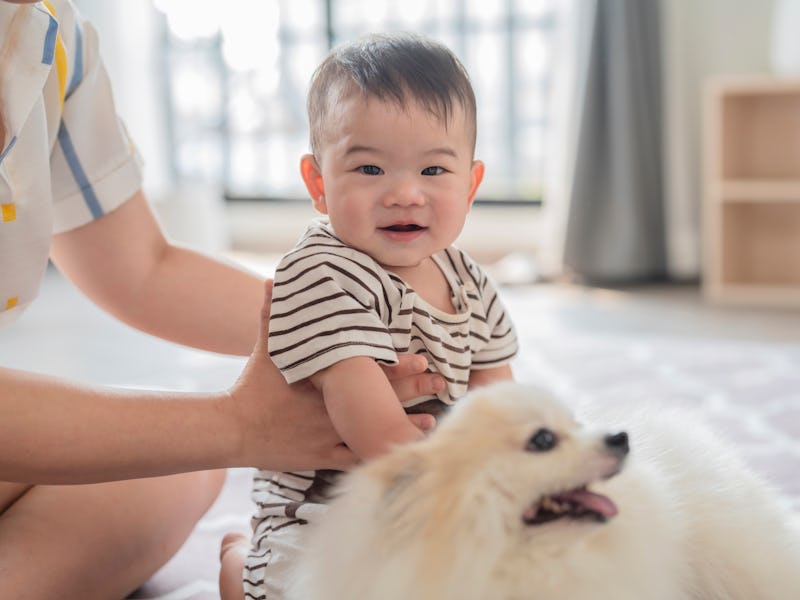Does Your Dog Know What a Baby Is? A Canine Expert Has a Surprising Answer
Turns out your dog may not know a baby from a chew toy (yikes).

As much as we all love videos of dogs and babies getting along, that’s not always the reality. Bringing home a baby is a huge change to an entire household, dogs included.
Pups, used to fulfilling the role of our spoiled fur babies, may experience all sorts of challenging emotions when they have to contend with a real one. Experts say this aberrant behavior comes from confusion and requires patience, flexibility, and love. Here’s what you need to know.
Does my dog know what a baby is?
Every dog will respond differently, says Jennifer Shryock, a certified dog behavior consultant and owner of North Carolina-based Family Paws, an organization that helps families navigate raising a dog and baby. While some dogs will be able to roll with a new family member and routine, others will have a hard time acclimating. Some of their behavior might not be new, but inopportune. They might, for example, whine for affection while someone is feeding the baby.
“They know that we're paying a lot of attention to the baby but they don't know that the baby is something special to us,” Shryock tells Inverse. “They don't know the baby from another toy that you brought home.”
While exuberance may seem like an ideal response, this reaction can get in the way, she says. Dogs may be over the moon to see their humans, but the humans with a new child in tow might not feel as eager to walk and play with their pup, which can dawn on your dog. As you’re caught in the whirlwind of learning to parent, your dog’s routine has been upended. Its beloved humans may not be available in the same way, nor may walks and playtime occur as regularly as before.
“A dog and baby on the scene, a parent is in between,” Shryock quips. In other words, don’t leave your baby alone with your dog.
If you are tempted to anthropomorphize your dog as jealous, Shryock says it doesn’t speak to the root of your dog’s behavior. “It really is the dog being very confused and not knowing how to get attention that used to be easy to get,” she says.
This confusion is why practice ahead is critical.
Pets need nesting, too
Preparation, Shryock says, is key to a well-adjusted dog. Part of her practice involves parents-to-be rehearsing with objects like large water bottles and pillows as stand-in infants. This trial gives the parents a chance to see what happens when they focus all their attention on something besides the dog. The dog can also grow accustomed to seeing their humans constantly cradling something.
Once the baby comes on the scene, Shryock calls this the homecoming. Following that, a dog might take three months to form a bond with the tiny human. Shryock advises against an introduction where the dog gets in a baby’s face because “we don't know whether or not that causes a stress response in the baby,” she says.
She also encourages expecting parents to find ways to engage their pooch that are low-energy but still enriching. Kibble hunts around the home or backyard, slow puzzle feeders, and obstacle courses are all methods to keep your pup preoccupied, Shryock says. If your dog is especially anxious, medication may also be a good option to discuss with your vet.
In short, your dog doesn’t hate your baby. It’s just trying to make sense of a new little creature.